- Home
- Stephen Hunter
The Master Sniper Page 12
The Master Sniper Read online
Page 12
Leets cleared his throat.
“Meisterschütze: master shot. Literally.”
“Ah, see, chum, you haven’t entered it. You don’t feel it. However can you hope to track a man whose nickname you cannot fathom?”
“I wasn’t finished, goddamn it,” Leets snarled.
“Meisterschütze, yes, master shot, and since the context is clearly military, one may indeed say, as did the Jew, master sniper. A nice turn of phrase: the man has some talent. He is a writer though, is he not? At any rate, it’s a higher form of rhetoric, more formal, playing on the long Germanic tradition of guilds, apprentices and journeymen. It’s more, shall we say, resonant.”
His cold smile drove the heat from the room. Clever bastard: a Bloomsbury wag, only-my-genius-to-declare amusement smug on his face.
But the lesson was unfinished.
“It’s not hard to see why they made such a hero of him, is it?”
“It’s part of another war,” Leets explained. He was ready for this one. “Waffen SS against the Wehrmacht. Nazis against the old boys, the Prussians who run the army. Repp is perfect. No aristo, just a country boy who can kill anything he can see. The prize is first place in line—Hitler’s line—for the new-model Panzers coming out of the shops, the Tigers. They were in the market for heroes, right?”
“Right, indeed,” admitted Tony.
“But more to the point: from this we can see how important Repp will be to the SS. That is to say, from here on in, he’s not just one of them. He is them. That is to say, he becomes their official instrument, the embodiment of their will. He’s—” he struggled for language in which to make this concept felt, “—he’s an idea.”
Tony scowled. “You’re talking like a don. Dons don’t win wars.”
“You’ve got to see in this a higher reality. A symbolic reality.” Leets himself wasn’t sure what he was saying. A voice from inside was doing the talking; somewhere a part of his mind had made a leap, a breakthrough. “When we crack it, I can guarantee you this: it will be pure Nazi, pure SS. Their philosophy, given flesh, set to walking.”
“Wow, Frankenstein,” called Roger, across the room.
“You Americans have too much imagination for anybody’s good. You go to too many films.”
But Tony had more.
“I have found,” he announced, “the Man of Oak.”
Leets turned. He could not read the Englishman’s face. It was impassive, imperial.
“Who?” Leets demanded.
“It occurs to me that we knew all along. We knew, did we not, that our phantom WVHA has an address in eastern Berlin. A suburb called Lichtenfelde; but the place itself goes by an older, more traditional name. It is called Unter den Eichen.”
He paused, allowing the information its impact.
“Translate it literally,” he advised some seconds later when he saw the befuddlement on Leets’s face.
Leets worked it out into English.
“‘Under the Oaks,’” he said.
“Yes.”
“Goddamn it!,” Leets said.
“Yes. And this Jewish chap presumably heard reference to a man from ‘Under the Oaks,’ as one would say ‘A Man from Washington,’ or ‘A Man from London,’ meaning a man of authority. But his knowledge of the language was imperfect, since his Yiddish only allowed him access to the most basic German. He garbled it, perhaps inflated it somewhat for rhetorical effect. Thus, Man of Oak, as Shmuel overheard him say.”
“Goddamn it,” Leets said again. “It must have been some officer, some supervisor. But it tells us nothing.”
“No, nothing: Another disappointment. It tells us only what we know.”
It was true. During the hot week with Shmuel, information had seemed to surge in on them. There had been so much to do. A powerful illusion of progress made itself felt. But in the very act of mounting, it had peaked. Leets saw this rather sooner than the others; now Tony had caught on: that, though all kinds of context and background were being assembled, the real nut of the problem had not yet been cracked. They knew Repp, and of his rifle, rudimentary facts, but compelling nonetheless. But they had no idea of more crucial matters. Who would the German shoot? When? Why?
“Your idea that somewhere in his testimony was a clue has gone up in smoke,” Tony said.
“We’ve got to find Anlage Elf, that’s all. Could we increase air recon of that area? Aren’t there French armored units closing in? Could they be directed to penetrate the forest, in hopes of—”
“No. Of course not. It’s huge, over and over we’ve remarked on how huge it is.”
“Goddamn it. We need something. A break.”
It arrived the next morning.
IN REF JAATIC REQUEST 11 MAR 45 THIS HQ ADVISES 3D SQD 2ND BN 45 INF DIV TOOK HEAVY CASUALTIES ON RECON PATROL 15 APRIL APPX 2200 HRS VICINITY ALFELD INTELL SUGGEST 11 ROUNDS 11 HITS IN DARK AND SILENCE ARMY GRP G-2 CONFIRMS WAFFEN SS UNIT HITLER-JUGEND THIS AREA PLS ADVISE
RYAN
MAJ INF
2ND BN G-2
“Well,” said Leets, ending the silence, “the fucking thing’s operational. They’ve worked out the bugs.”
“Rather,” said Tony.
“They can go anytime they want.”
Leets and Outhwaithe flew into the 45th Division’s sector early the next morning, landing in a Piper Cub not far from Alfeld, the divisional headquarters. Ryan’s shop, though, was farther toward the front. And here there was a front, in the classical sense: two armies facing each other warily across a bleak, crater-scaped gulf of no-man’s land, after the configuration of the last war. The Americans had gone across this raw gap many times, and each time, bitterly, they were driven back by the Panzergrenadiers of “Hitler-jugend.” So when Leets and Outhwaithe, in strange new combat gear they’d picked up for their trip to the line, approached the blown-out farmhouse in which Ryan’s G-2 outfit hung out, they were not surprised by the sullenness with which they were greeted. Outsiders, fresh, strange officers, one a foreigner, an exotic Brit, rear-echelon types: they expected to be hated, in the way locals always hate tourists; and they were.
“I never saw anything like it,” Major Ryan, a sandy-haired freckled man whose nose ran constantly, told them. “Center chest, one shot each. No blood. Patrol that found them thought they were sleeping.”
“And at night? Definitely at night?” Leets pushed.
“I said at night, didn’t I, Captain?”
“Yes, sir, it’s just that—”
“Goddamn it, if I say at night, I mean at night.”
“Yes, sir. Can we get up there?”
“This is a combat zone, Captain. I don’t have time to take people on trips.”
“Just point us in the right direction. We’ll find it.”
“Jesus, you guys are eager. All right, but goddamn it, get yourselves a helmet. It’s right smack in Kraut country.”
The Jeep could only get them so close; after that it was a walk in the sun. A sign in a shattered tree announced the sudden change in climate tersely and without fanfare: “YOU ARE UNDER OBSERVED ARTILLERY FIRE THE NEXT 500 YARDS” in standard GI stenciling, all the letters split neatly in two; but a wit had edited an improvement into the copy, replacing the word “artillery” with “sniper” in bold child’s scrawl. The war was everywhere up here, in the wary quick stares of the men who were fighting it, the hulks of burnt-out armor that littered the landscape, in the haze of smoke, heavy and lazy, that adhered to everything, and beneath it another odor that infiltrated the nostrils.
Leets sniffed.
“Ever been in a combat zone, Captain?” asked Ryan.
“Nothing stable like this. I did some running around behind the lines last summer.”
“I recognize the odor,” said Tony. “Bodies out there. Beyond the wire.”
“Yeah,” confirmed Major Ryan. “Theirs. Just let ’em try and come out and bury ’em.”
“My father,” said Outhwaithe, “mentioned it in his letters. The Somme, a
ll that, ’14 to ’18. I read them later.”
They began to encounter the infantrymen here, just behind the line, relaxing around cooking fires, or simply dozing in the shadows of half-tracks and Jeeps. The still landscape actually teemed with men, though if there was a principle of organization behind all this casual cluster, Leets missed it. Who was in charge? Nobody. Who knew what they were doing? Everybody. But Leets did not feel himself the object of curiosity as he scurried along, self-consciously clean and unaccustomed to the crack of bullets aimed his way. Nobody cared. He was not German; he was not an officer who could send anybody out on patrol or launch an attack; therefore he was not significant. A couple of tired-looking teen-agers with BAR’s twice their size looked at him stupidly. It did not occur to them to salute, or to him to require it. Farther on, some wise man cautioned, “Keep your asses low.”
A final hundred yards had to be covered belly-down, without dignity, across a bare ridge, through a farmyard, to a low stone wall.
Here, settled in cozy domesticity, had gathered still more GI’s. Weapons poked through holes punched in the wall or rested on sandbags in the gaps of the wall, and a scroll of barbed wire, jagged and surreal, unreeled across the stones; yet for all these symbols of the soldier’s trade, Leets still felt more as if he’d crashed a hobo’s convention. Unshaven men, grousing and farting, clothes fetid, toes popping hugely out of blackish OD socks, lay sprawled about in assorted poses of languor. A few peered intently out through gaps in the wall or Y-shaped periscopes at what lay beyond; but most just loafed, cheerful and uncomplicated, enjoying the bright moment for what it was.
The platoon leader, a young lieutenant who looked tireder than Ryan, crawled over, and a meeting convened in the lee of the wall.
“Tom,” said Ryan, “these fine gents flew in special from London; they’re after a big story.” Newspaper lingo seemed to be Ryan’s stock in trade. “Not their usual beat at all, but here they are. And the story, in time for the late editions, is Third Squad.”
“Never knew who turned the lights out on ’em,” said Tom.
More precisely, thought Leets, who turned the lights on.
A sergeant was soon summoned who’d been at the wall the night of the patrol, evidently pulled from sleep, for the flecks of crud still clotted in his eyes. He affected the winter-issue wool-helmet cap, called a beanie and useless except for decoration in this warm weather, and he yanked hard on a dead cigar. All these men who lived in the very smile of extinction insisted on being characters, vivid and astonishing, rather than mere soldiers. They looked alike only for the second it took to categorize their eccentricities.
“Not much to tell, sir,” he said, not knowing which of the four officers to address. “You can see if you’re careful.” He gestured.
Leets took off his borrowed helmet, and eased a dangerous half a head up over the wall. Germany, tidy and ripening in the spring, spilled away.
“Just to the left of those trees, sir.”
Leets saw a stand of poplars.
“We sent ’em out looking for iron,” explained Ryan, not bothering to explain that in the patois, iron meant armor. “‘Hitlerjugend’ is technically a Panzer division, though we’re not sure if they’ve got any operational stuff. We didn’t run into it on our trips over there, but who had time to look? I just didn’t want any Bulge-type surprises coming into the middle of my sector.”
“Sir,” the young sergeant continued. “Lieutenant Uckley, new guy, he took ’em down that hill, then across the field, long way to crawl. They were okay there, we found chewing gum wrappers. When they got to those trees, they went up that little draw.”
Leets could see a fold in the earth, a kind of gully between two vaguely rising landforms.
“But you didn’t hear anything? Or see anything?”
“No, sir. Nothing. They just didn’t come back.”
“Did you recover Third Squad’s bodies?” asked Outhwaithe.
“Yes, sir,” piped the lieutenant. “Next day. We called in smoke and heavy Willie Peter. Went out myself with another patrol. They’d been dropped in their tracks. Right in the ticker, every last one. Even the last guy. He didn’t have time to run, that’s how fast it was.”
Leets turned to Ryan. “The bodies. They’d be at Graves Registration?”
Ryan nodded. “If they haven’t been shipped out to cemeteries yet.”
“I think we ought to check it out.”
“Fine.”
“Sir,” asked the sergeant.
Leets turned. “Yeah.”
“What did he hit ’em with?”
“Some kind of night vision gear. It was broad daylight for him.”
“You’re looking for this guy, right?”
“Yeah.”
“Well,” said the sergeant, “I went looking for him too.” A tough kid, made his stripes at what, eighteen, nineteen? Good man in a fire fight, natural talent for it. “Had me a BAR and twenty clips.”
“But no luck,” said Leets.
“Nah, uh-uh.”
You did have luck, kid: you didn’t run into Repp; you’re still alive.
“I had friends in that squad, good people. When you catch this guy, burn him. Huh? Burn him.”
The Graves Registration section took the form of a forty-cot hospital tent some miles behind the front lines, and into this tent sane men seldom ventured. Leets, Outhwaithe, Major Ryan and an Army doctor stood in the dank space with the dead, rank on rank of them, in proper order, awaiting shipment, neatly pine-boxed. Everything possible had been done to make the location pleasant, yet everything had failed and the odor that had paused at Leets’s nostrils on the line hung here pungent and tangible, though one adjusted to it quickly.
“Thank God it’s still coolish,” said Outhwaithe.
The first boy was no good to them. Repp had hit him squarely in the sternum, that cup of bone shielding, however ineffectively, the heart, shattering it, heart behind and assorted other items, but also shattering, most probably, the bullet.
“Nah,” said the doc, “I’m not cracking this guy. You won’t find a thing in there except tiny flakes cutting every which way. Tell ’em to look some more.”
And so the Graves Registration clerks prowled again through the stacked corridors of the dead, hunting, by name off the list 45th Division HQ had provided, another candidate.
The second boy too disappointed. Repp was less precise in his placement, but the physician, looking into the opened body bag in the coffin, judged it no go.
“Nicked a rib; that’ll skew the thing off. No telling where it’ll end up—foot or hip. We don’t have time to play hide-and-seek.”
A success was finally achieved on a third try. The doctor, a stocky, blunt Dartmouth grad with thick clean hands and the mannerisms of an irritated bear, announced, “Jackpot—between the third and fourth ribs. This guy’s worth the effort.”
The box was dollied into the mortuary tent.
The doctor said, “Okay, now. We’re gonna take him out of the bag and cut him open. I can get an orderly over here in an hour or so. Or I can do it now, this minute. The catch is, if I do it now, somebody here’ll have to help. You’ve seen battle casualties before? You’ve seen nothing. This kid’s been in the bag a week. You won’t recognize him as human.”
The doctor looked briefly at each of them. He had hard eyes. How old? Leets’s age, twenty-seven maybe, but with a flinty glare to his face, pugnacious and challenging. Guy must be good, Leets thought, realizing the doctor was daring one of them to stay.
“I’ll do it,” he said.
“Fine. Rest of you guys, out.” The others left. Leets and the doctor were alone with the bagged form in the box.
“You’d best put something on,” the doc said, “it’s going to be messy.”
Leets took his coat off and threw on a surgical gown.
“The mask. The mask is most important,” the doctor said.
He tied the green mask over his nose and mouth, thinking again
of Susan. She lives in one of these things, he thought.
“Okay,” the doctor said, “let’s get him onto the mortuary table.”
They reached in and lifted the bagged thing to the table.
“Hang on,” the doctor said, “I’m opening it.”
He threw the bag open.
“You’ll note,” he said, “the characteristics of the cadaver in the advanced state of decomposition.”
Leets, in the mask, made a small, weak sound. No words formed in his brain. The cadaver lay in rotten splendor in its peeled-back body bag on the table.
“There it is. The hole. Nice and neat, like a rivet, just left of center chest.”
Swiftly, with sure strokes, the doctor inscribed a Y across the chest, from shoulder down to pit of stomach and then down to pubis. He cut through the subcutaneous tissue and the cartilage holding skin and ribs together. Then he lifted the central piece of the chest away and reflected the excess skin to reveal the contents.
“Clinically speaking,” the doctor said, looking into the neat arrangement, “the slug passed to the right of the sternum at a roughly seventy-five-degree angle, through the anterior aspect of the right lung”—he was sorting through the boy’s inner chest with his gloved fingers shiny—“through the pericardial sac, the heart, rupturing it, the aorta, the right pulmonary artery—right main-stem bronchus, to be exact—the esophagus, taking out the thoracic duct and finally—ah, here we are,” cheerful, reaching the end of his long shuffle, “reaching the vertebral column, transecting the spinal cord.”
“You got it?”
The doctor was deep inside the boy, going through the shattered organs. Leets, next to him, thought he was going to be sick. The smell rose through the mask to his nostrils, and pain bounded through his head. He felt he was hallucinating this: a fever dream of elemental gore.
“Here, Captain. Your souvenir.”
Leets’s treasure was a wad of mashed lead, caked with brown gristle. It looked like a fist.
“They usually open up like that?”
“Usually they break apart if they hit something, or they pass on through. What you’ve got there is a hollow nose or soft point or something like that. Something that inflates or expands inside, I think they’re illegal.”

 Point of Impact
Point of Impact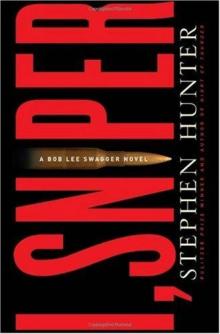 I, Sniper
I, Sniper Havana
Havana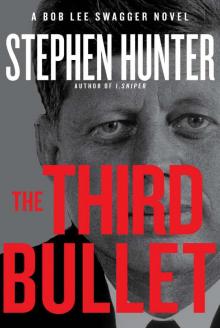 The Third Bullet
The Third Bullet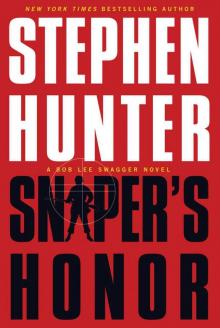 Sniper's Honor: A Bob Lee Swagger Novel
Sniper's Honor: A Bob Lee Swagger Novel Dirty White Boys
Dirty White Boys The 47th Samurai
The 47th Samurai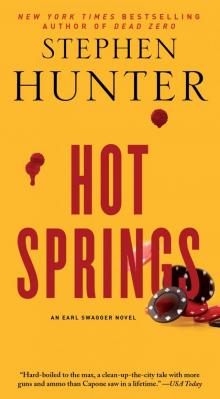 Hot Springs
Hot Springs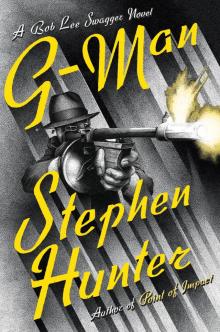 G-Man
G-Man Black Light
Black Light Time to Hunt
Time to Hunt The Day Before Midnight
The Day Before Midnight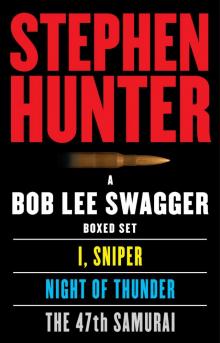 A Bob Lee Swagger Boxed Set
A Bob Lee Swagger Boxed Set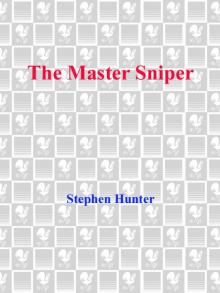 The Master Sniper
The Master Sniper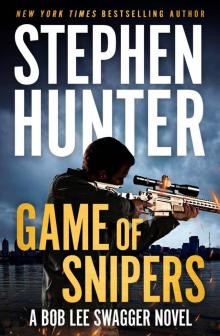 Game of Snipers
Game of Snipers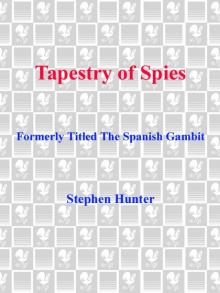 Tapestry of Spies
Tapestry of Spies Citadel
Citadel The Second Saladin
The Second Saladin Stephen Longacre's Greatest Match
Stephen Longacre's Greatest Match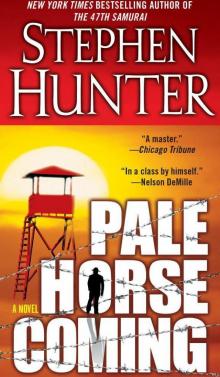 Pale Horse Coming
Pale Horse Coming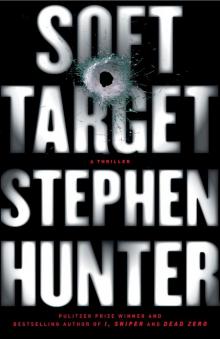 Soft Target
Soft Target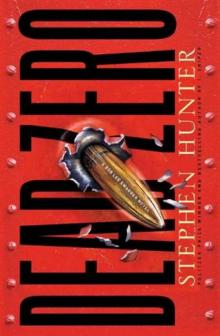 Dead Zero
Dead Zero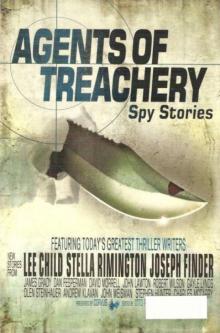 Casey at the Bat
Casey at the Bat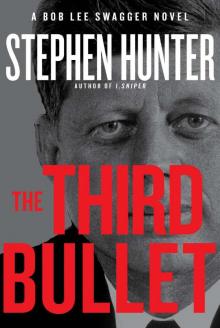 The Third Bullet bls-8
The Third Bullet bls-8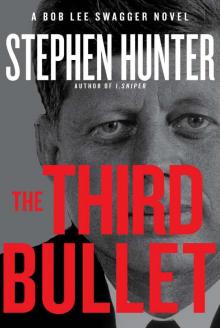 The Third Bullet: A Bob Lee Swagger Novel
The Third Bullet: A Bob Lee Swagger Novel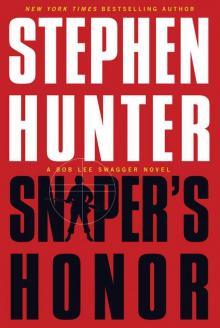 Sniper's Honor
Sniper's Honor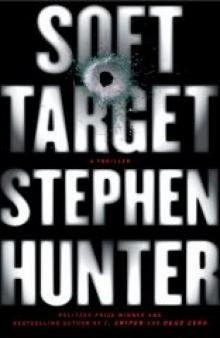 Soft target rc-1
Soft target rc-1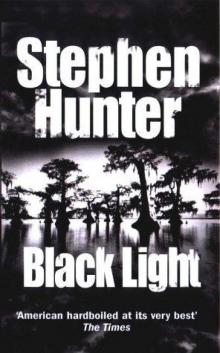 Black Light bls-2
Black Light bls-2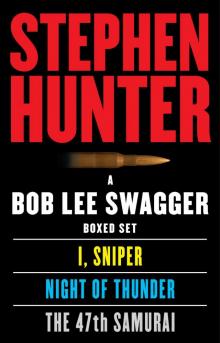 A Bob Lee Swagger eBook Boxed Set: I, Sniper, Night of Thunder, 47th Samurai
A Bob Lee Swagger eBook Boxed Set: I, Sniper, Night of Thunder, 47th Samurai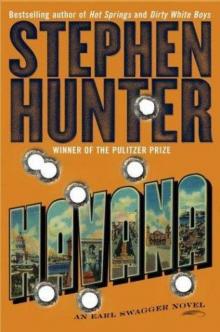 Havana es-3
Havana es-3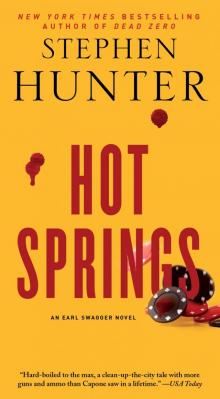 Hot Springs (Earl Swagger)
Hot Springs (Earl Swagger)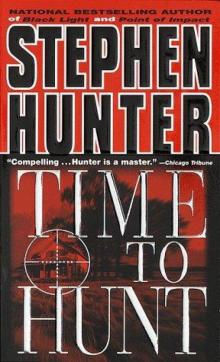 Time to Hunt bls-1
Time to Hunt bls-1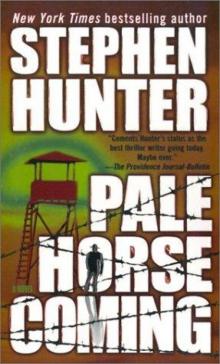 Pale Horse Coming es-2
Pale Horse Coming es-2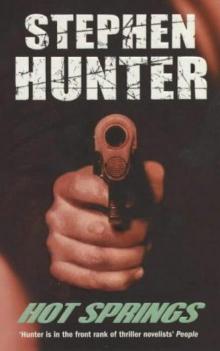 Hot Springs es-1
Hot Springs es-1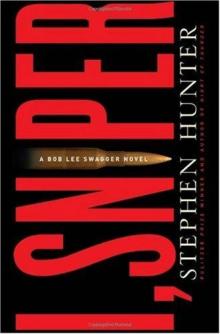 I, Sniper: A Bob Lee Swagger Novel
I, Sniper: A Bob Lee Swagger Novel